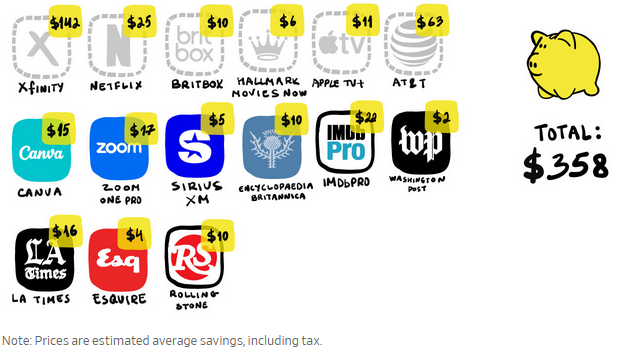A Wall Street Journal Finance writer wrote an article bragging about how all the subscriptions he had that he canceled pays for his lease on a Tesla Model Y. The key takeaway for me was the vast number of subscriptions this Finance writer had accumulated. This screen shot shows the large number of subscriptions that he canceled (or in the case of SiriusXM, the price cut that he negotiated):
And he still has all of these sucking money.
We still have Disney+, Hulu, Max, the language-learning service Duolingo and, of course, Spotify. We get three print newspapers delivered and many more digital news subscriptions.
It’s certainly true that a finance writer could easily need all those news outlet subscriptions, but who has that many extraneous subscriptions? Especially subscriptions to which, as this writer freely admitted in his article, they don’t even listen to or watch for weeks, months, on end.
My wife and I have an online subscription to the WSJ, a two-line subscription to Verizon for our cell phones, and a Spectrum cable subscription that provides us with our TV (no premium cable channels; it’s not quite the most basic bundle, but it’s pretty bare bones), Internet, and landline. There is a double potful of online news outlets to which we can link, for free, through our browser, and there are libraries in the nearby, also. And books. We read those for entertainment, edification, and straight up education. We read them in print version: those libraries, brick-and-mortar bookstores, and online booksellers.
We’ve thought about cutting the landline out of our cable subscription, but it’s proved too useful as a honeytrap for all the spam calls that come rolling in. As it happens, we have an answering machine capability on our landline phone that plays any messages being left as they’re being left. On those rare occasions when we recognize the voice and are interested in talking to the person, we can go ahead and pick up.
Oh, and he had this in his brag about having saved enough to cover the cost of his car:
…the cost [of his Model Y] dropped to $53 for a car we desperately needed.
He might have desperately needed a car, but he only desperately wanted the Tesla.
